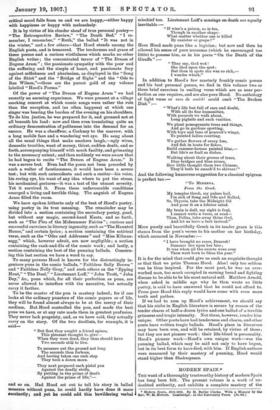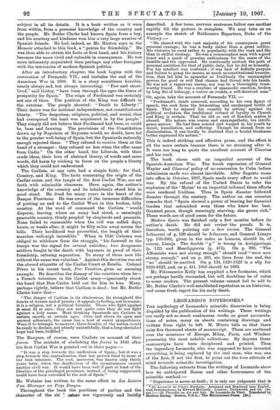MODERN SPAIN.•
THE want of a thoroughly trustworthy history of modern Spain has long been felt. The present volume is a work of un- doubted authority, and exhibits a complete mastery of the • Modern Spain, 1816-1808. By H. Butler Clarke With s Memoir by the
• Bey. W. H. Hatton. Cambridge at the University Press. 17e. 62.]
subject in all its details. It is a book written as it were from within, from a personal knowledge of the country and the people. Mr. Butler Clarke had known Spain from a boy, and his courtesy and kindness won him a very large number of Spanish friends. He bad, indeed, as Mr. Hutton says in the Memoir attached to this book, a "genius for friendship." He was thus able to obtain his facts at first hand, and his history becomes the more vivid and valuable in consequence. He was more intimately acquainted than perhaps any other foreigner with the intricacies of modern Spanish politics.
After an introductory chapter, the book begins with the restoration 'of Fernando VII., and includes the end of the American War in 1898. It is a story sometimes horrible, nearly always sad, but always interesting. "Few and short- 'lived," said Godoy, "have been through the ages the times of 'prosperity for Spain." The reign of Ferdinand was certainly not one of them. The position of the King was difficult in the extreme. The people shouted : "Death to Liberty.!" Their desire was for national independence, not constitutional liberty. " The despotism, religious, political, and social, that had overspread the land was acquiesced in by the people." They simply did not believe that Ferdinand had been, or could be, base and fawning. The provisions of the Constitution drawn up by Napoleon at Bayonne would, no doubt, have led to the greater well-being of Spain, but the Spaniards naturally enough rejected them. " They refused to receive them at the band of a stranger : they refused no less when the offer came from Cadiz." On the other hand, the Liberals, with their crude ideas, their love of abstract theory, of words and more words, did harm by wishing to force on the people a liberty which they could not understand.
The Carnets, at any rate, had a simple faith: for God, Country, and King. The facts concerning the origin of the Carlist cause, and the tangle of the first Carlist War, are set forth with admirable clearness. Here, again, the author's knowledge of the country and its inhabitants stood him in good stead. He lived for many years in the heart of the Basque Provinces. He was aware of the immense difficulties of putting an end to the Carlist Wars in this broken, hilly country. At the word of command the Carlists " would disperse, leaving, where an army had stood, a seemingly peaceable country, thinly peopled by shepherds and peasants. None failed to reassemble when the roll was called days, hours, or weeks after, it might be fifty miles away across the hills. Their hardihood was proverbial, the length of their marches well-nigh incredible?' When in 1840 Cabrera was obliged to withdraw from the struggle, "his farewell to the troops was the signal for several suicides ; two Aragonese soldiers fought to the death with bayonets in proof of their friendship, refusing separation. To many of these men life without the cause was valueless." Against this devotion was set the absurd etiquette of the Carlist Court at Estella. Colonel Peroz in his recent book, Par Vocation, gives an amusing example. He describes the dismay of the courtiers when he— a French volunteer in the Carlist army—ignorantly shook the hand that Don Carlos held out for him to kiss. Many, perhaps rightly, believe that Carlism is dead ; but Mr. Butler Clarke knew that— "The danger of Carlism is its elusiveness, its stronghold the hearts of women and of priests : it appeals to feeling, not to reason ; it is a religion, not a political formula. Those who fight against it seem ill at ease: they are not quite sure they do not fight against a holy cause. Most thinking Spaniards are Carlista in certain moods, at certain ages. Over and above its open and avowed adherents, the cause has a host of secret sympathisers. Were it to triumph to-morrow, three-fourths of the nation would be ready to declare, not utterly untruthfully, that a long-cherished hope had been fulfilled."
The Basques, of course, were Carlists on account of their fueros. The mistake of abolishing the fueros in 1841 after the first Carlist War is pointed out in these pages :— " It was a step towards the unification of Spain ; but it was a step towards the centralisation that has proved fatal to some of her best interests. The cost, moreover, was known only thirty years later, when the disaffection of the mountaineers caused another civil war. It would have been well if part at least of the liberties of the privileged provinces, instead of being suppressed, could have been extended to the rest of Spain."
Mr. Webster has written to the same effect in Les Loisirs d'un, Stranger an Pays Basque.
Throughout the book the positions of parties and the character of the chi fir= are vigorously and lucidly described. A few terse, nervous sentences follow one another rapidly till the picture is complete. We may take as an example the sketch of Baldomero Espartero, Duke of the Victory :—
" He shared with the vast majority of his countrymen great personal courage; he was a lucky rather than a great soldier. His victories he owed rather to popularity with the rank and file than to skilful strategy. He was a commonplace man with a good heart and a spark of genuine enthusiasm for the cause of the humble and the oppressed. He continually mistook the path of personal ambition for that of public duty, but he did so honestly. For his intellect was confused ; it was lack of definite purpose and failure to grasp the means, as much as constitutional irresolu- tion, that led him to squander so fruitlessly the unexampled powers for good or evil that chance had thrust into his hands. He was not a rancorous enemy, nor was he a thoroughly trust- worthy friend. He was a creature of spasmodic emotion, broken by long fits of lethargy, a waiter on events, a self-deceived man."
Or, again, take the account of Fernando VII. :— "Ferdinand's death removed, according to his own figure of speech, the cork from the fermenting and surcharged bottle of Spain. That he injured his country by setting against its political evolution the traditional virtues of loyalty to Church and King is certain. That he did so out of fiendish malice is absurd. His nature was coarse and unsympathetic, his intelli- gence narrow. He had been soured and warped in his youth by deceit, humiliation, and suffering. Though he shrank from no dissimulation, it can hardly be doubted that a brutal frankness better expressed his nature."
This is indeed striking and effective prose, and the effect is all the more certain because there is no straining after it. It were too long to quote the excellent account of C;Inovas and his work.
The book closes with an impartial account of the Spanish-American War. The harsh repression of General Weyler and Clinovas' policy of no concession to Cuba before submission made war almost inevitable. After Sagasta came into office in October, 1897, Spain made every effort to avoid war. By the refusal of the United States to refer the explosion of the 'Maine' to an impartial tribunal these efforts were rendered fruitless. Thus in Spain disaster followed disaster through the century. The author on one occasion remarks that " Spain showed a power of bearing her financial burden that astonished even those who knew her best. Granted peace, though seemingly starving, she grows rich." These words are of good omen for the future.
Modern Spain was finished only a few months before its author's death. He did not reviser the proofs. It is, therefore, worth pointing out a few errors. The General Iribarreri of p. 139 should be Iribarren, and General Linaye (pp. 159-160), given in the index as Linares, should be, of course, Linaje. The double " g" is wrong in Arriggoriaga (p. 122) and Mendiggorria (p. 475). On p. 396, " The Alfonsists were not strong enough" should read "were now strong enough," and on p. 493, six lines from the end, the "no" should be omitted. On p. 134,1520-1523 is a slip for 1820-1823, and, on p. 451, 1903 should be 1893.
Mr. Fitzmaurice Kelly has supplied a few footnotes, which are perhaps hardly warranted, but will doubtless be of value to some readers. The present volume cannot fail to add to Mr. Butler Clarke's well-established reputation as an historian, and cause fresh regret for his early death.







































 Previous page
Previous page